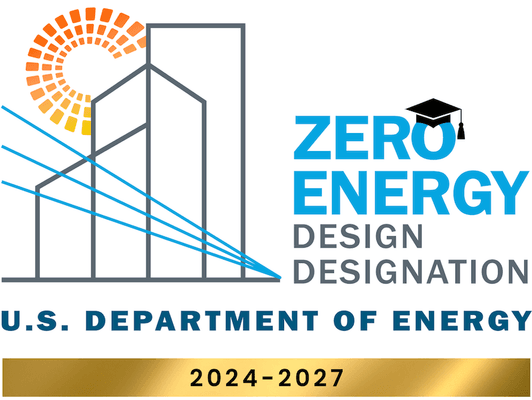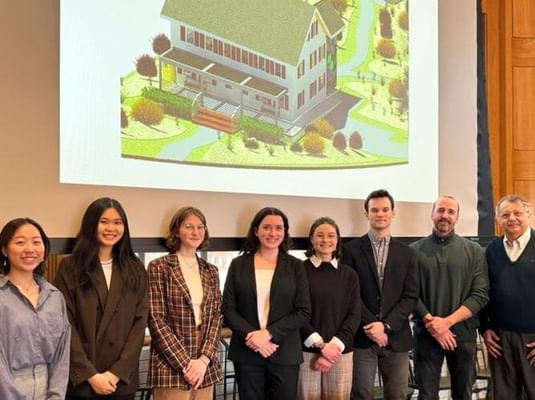- Undergraduate
Bachelor's Degrees
Bachelor of ArtsBachelor of EngineeringDual-Degree ProgramUndergraduate AdmissionsUndergraduate Experience
- Graduate
Graduate Experience
- Research
- Entrepreneurship
- Community
- About
-
Search
All Thayer News


Dartmouth Engineering Earns DOE's Zero Energy Design Designation
Sep 17, 2024 | by Matt Golec
Dartmouth's undergraduate engineering programs have earned the US Department of Energy's (DOE) Zero Energy Design Designation for its exemplary project-based curriculum in sustainable design.

The Zero Energy Design Designation (ZEDD)—part of a White House initiative to reach a net-zero emission economy by 2050—recognizes degree programs that promote and integrate zero-energy design and engage students in creating a future with high-efficiency, low-carbon emissions buildings.
Dartmouth's Bachelor of Arts in engineering sciences and accredited Bachelor of Engineering were among 14 degree programs at nine institutions this year to earn the three-year designation, effective through 2027.
"This designation recognizes our commitment, at a systems-level, to zero-energy design in our undergraduate engineering curriculum and to creating the next generation of engineers with skills necessary to create truly human-centered solutions to climate change," says Douglas Van Citters, professor of engineering and associate dean of undergraduate engineering education.
"I've been working on this curriculum for four years," says Karolina Kawiaka, architect and senior lecturer in studio art and engineering, who teaches ENGS 44: Sustainable Design and led the ZEDD application effort.
Her students apply what they've learned to design zero-net-energy-use affordable housing in local communities. Explains Kawiaka, "The course project requires designing buildings that work well for the occupants while maximizing efficiency and minimizing cost of the building envelope, and using healthy and low-embodied carbon materials."
With additional guidance from experts in the field, Kawiaka says students have embraced the challenge of balancing cost with energy use while making inspiring and healthy places to live. "We work with many alumni and local partners," she says. "I'm grateful for their help and sharing their expertise with the students."
With 35 percent of energy-related carbon emissions in the nation coming from buildings, the building sector has become an important area of focus for addressing climate change, according to DOE.

BE students Grace Turner '23, Colin Braun '23, Sierra Lee '24, Katie Casson '23, Dual-Degree student Sarah Nam, and MS student Sarah Hutchinson '22 Th'23 advanced to the finals of DOE's Solar Decathlon® 2024 Design Challenge. Advised by professors Benoit Cushman-Roisin and Shea Hagy, and Thayer alum Carolyn McShea '18, the team designed an accessible, community-fostering, net-zero retrofit of a three-apartment building in Wilder, VT.
From green tiny houses to retro-fitting energy-efficient solutions to old campus buildings, Dartmouth's undergraduate engineering curriculum has long integrated project-based learning rooted in finding solutions to current, real-life challenges, Van Citters says.
Student projects that helped earn the designation include Dartmouth's submission to DOE's 2024 Solar Decathlon Design Challenge, in which interdisciplinary student teams create high-performance building designs to address a real-world issue related to climate change, affordability, and environmental justice. Dartmouth's team advanced this year as one of 40 finalists with their design of an accessible, net-zero energy retrofit of a three-unit apartment building in Wilder, Vermont.
This designation also comes as Dartmouth begins implementing its decarbonization plan with the goal of decreasing campus energy carbon emissions to zero, in large part through a transition to highly efficient buildings and low-carbon energy sources. Campus will serve as a living lab as the projects become drivers of new research, teaching, and collaboration.
"Our climate conditions are worsening year by year—we need schools to prepare the next generation to design for future conditions, not the past," said Amy Royden-Bloom, Residential Buildings Integration program manager at the Building Technologies Office. "The programs recognized in this year's ZEDD cohort are doing just that and should be commended for being on the forefront of tackling climate change."
This year's ZEDD cohort joins the 39 degree programs at 26 institutions nationwide recognized in 2022 and 2023. The designation lasts three years, after which institutions are eligible to reapply.
For contacts and other media information visit our Media Resources page.
